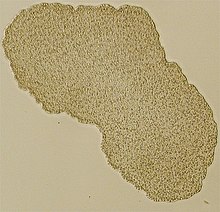Trichoplax
(Redirectum de Trichoplax adhaerens)
Trichoplax (Schultze, 1883) est unicum genus Placozoorum, quod unam speciem, Trichoplacem adhaerentem, continet.
- Phylum: Placozoa
- Familia: Trichoplacidae
- Genus: Trichoplax (Schultze, 1883)
- Familia: Trichoplacidae
- Phylum: Placozoa

Species
recensere- Trichoplax adhaerens (Schultze, 1883)
Nexus externi
recensere| Situs scientifici: • ITIS • NCBI • Biodiversity • Encyclopedia of Life • WoRMS: Marine Species • Fossilworks |
| Vide "Trichoplax" apud Vicispecies. |
Notae
recensere- Buchholz, K. and Ruthmann, A., 1995, The mesenchyme-like layer of the fiber cells of Trichoplax adhaerens (Placozoa), a syncytium, Zeitschrift fuer Naturforschung Section C Biosciences, 50, 282-285.
- Collins, A. G., 1998, Evaluating multiple alternative hypotheses for the origin of Bilateria: An analysis of 18S molecular evidence, Proceedings of the National Academy of Sciences, USA, 95, 15458-15463.
- Grell, K.G. 1982. Placozoa. In Parker, S.P., Synopsis and Classification of Living Organisms, vol. 1. McGraw-Hill, New York: 639.
- Grell, K. C. and Lopez-Ochoterena, E., 1987, A new record of Trichoplax adhaerens F. E. Schulze (Phylum Placozoa) in the Mexican Caribbean Sea, Anales del Instituto de Ciencias del Mar y Limnologia Universidad Nacional Autonoma de Mexico, 14, 255-256.
- Grell, K. G. and Ruthmann, A., 1991, Placozoa, in F. W. Harrison and W. J. A (ed.), Microscopic Anatomy of Invertebrates, Vol. 2. Placozoa, Porifera, Cnidaria, and Ctenophora (New York: Wiley-Liss), pp. 13-28.
- Pearse, V. B., 1989, Growth and behavior of Trichoplax adhaerens: First record of the phylum Placozoa in Hawaii [USA], Pacific Science, 43, 117-121.
- Schuchert, P., 1993, Trichoplax adhaerens (Phylum Placozoa) Has Cells That React with Against the Neuropeptide Rf Amide, Acta Zoologica (Copenhagen), 74, 115-117.